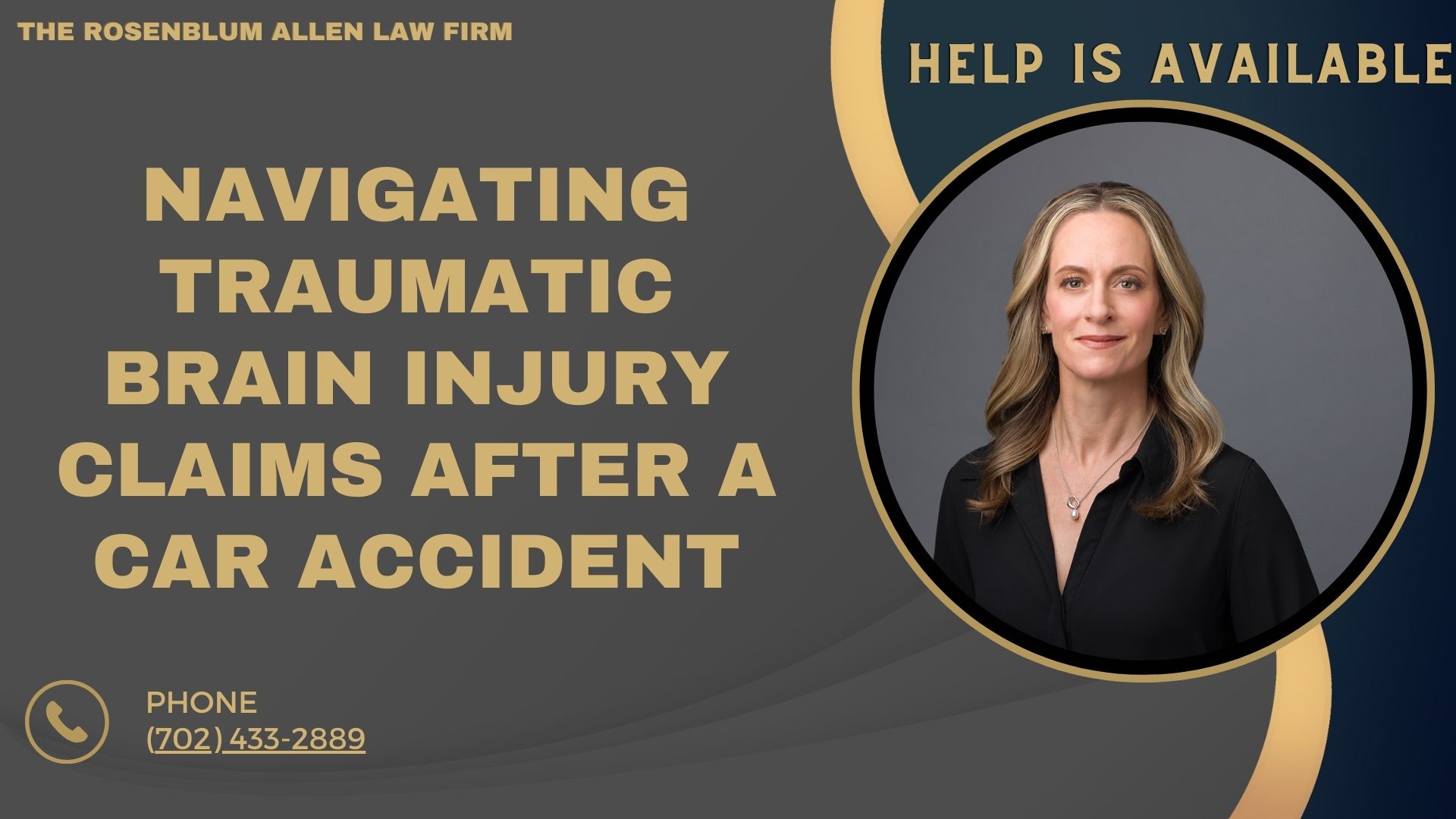A car accident can change your life in an instant—especially if it results in a traumatic brain injury (TBI). If you or a loved one suffered a brain injury in a crash, you may have many questions. How serious is the injury? Who is responsible? How will you cover medical bills and lost wages?
Understanding the legal process for brain injury claims can help you secure the compensation you need. This guide walks you through everything you should know.
 Understanding Brain Injury Claims
Understanding Brain Injury Claims
What Is a Traumatic Brain Injury (TBI)?
A traumatic brain injury (TBI) occurs when a sudden impact or jolt to the head damages brain function. Even a mild TBI, like a concussion, can have lasting effects. Severe TBIs can lead to permanent disabilities or even be fatal.
Common Causes of TBIs in Car Accidents
Car accidents are one of the leading causes of TBIs. A crash can cause a brain injury in several ways:
- Direct impact – Hitting your head on the steering wheel, dashboard, or window.
- Whiplash-related injury – The brain moves forcefully inside the skull due to sudden acceleration or deceleration.
- Flying debris – Loose objects in the car striking the head.
- Ejection from the vehicle – Being thrown from the car can cause a severe head injury.
Symptoms and Long-Term Effects of TBIs
Brain injuries don’t always show immediate symptoms. Some signs may appear hours or even days after an accident.
Common symptoms include:
- Headaches
- Dizziness
- Nausea or vomiting
- Memory problems
- Sensitivity to light and noise
- Difficulty concentrating
- Mood swings
Long-term effects may include:
- Cognitive impairments (trouble thinking or remembering)
- Emotional changes (depression, anxiety, irritability)
- Loss of motor skills or coordination
- Sleep disorders
- Chronic pain or headaches
Seeking medical attention as soon as possible is critical—even if you feel fine after the accident.
How Brain Injuries Impact Personal Injury Claims
A TBI can make a personal injury claim more complex. These cases often require extensive medical evidence and expert testimony. Insurance companies may try to minimize payouts, making legal representation crucial.
Proving Liability in a TBI Case
To recover compensation, you must prove that someone else’s negligence caused your injury. This may involve:
- Police reports – Official documentation of the accident.
- Eyewitness statements – Testimonies from people who saw the crash.
- Traffic camera footage – Video evidence of what happened.
- Accident reconstruction – Experts analyzing the crash scene and vehicle damage.
The Role of Medical Evidence in Your Claim
Medical evidence is critical in proving the severity of a TBI. Your attorney may use:
| Medical Evidence | Purpose |
|---|---|
| MRI and CT scans | Show physical brain damage |
| Doctor’s diagnosis | Confirms the injury type and severity |
| Neuropsychological testing | Assesses cognitive and emotional effects |
| Medical records and bills | Proves treatment costs |
| Expert medical testimony | Explains long-term impact |
If your injury affects your ability to work, vocational experts may also testify about lost earning capacity.

Steps to Take After Suffering a Brain Injury in a Car Accident
If you or a loved one suffered a brain injury in a car accident, the steps you take next can significantly impact your health and your claim.
Seeking Immediate Medical Attention
After a crash, adrenaline may mask injury symptoms. Even if you feel fine, see a doctor right away. A medical professional can check for signs of a brain injury, some of which may not appear until hours or days later.
Importance of Documenting Symptoms and Treatment
Keeping track of your medical care is critical. Your medical records will serve as key evidence in your claim.
Here’s what you should document:
- Symptoms you experience – Headaches, memory problems, dizziness, or mood changes.
- Doctor visits – Dates, diagnoses, and prescribed treatments.
- Medications prescribed – Pain relievers, anti-seizure drugs, or other medications.
- Therapies needed – Physical, occupational, or speech therapy.
A detailed medical record helps prove the severity of your injury and the long-term effects it may have on your life.
Gathering Evidence for Your Claim
Building a strong claim requires solid evidence. The more documentation you have, the better your chances of securing fair compensation.
Medical Records and Expert Testimony
Medical evidence is one of the most critical aspects of your claim. This includes:
- Emergency room records – Proof of initial treatment.
- Neurological tests – MRIs, CT scans, and brain function tests.
- Doctor’s notes – Statements from physicians confirming your diagnosis and limitations.
- Expert testimony – Medical experts explaining the long-term impact of your injury.
Accident Reports and Witness Statements
Beyond medical records, other evidence can support your case:
| Type of Evidence | How It Helps Your Case |
|---|---|
| Police report | Confirms accident details and fault |
| Witness statements | Provides third-party accounts of the crash |
| Photos of the scene | Shows vehicle damage and road conditions |
| Traffic camera footage | Provides visual proof of what happened |
An attorney can help you gather and organize this evidence to strengthen your claim.
Consulting a Personal Injury Attorney
Brain injury cases are complex. Insurance companies may downplay your injury or delay your claim. A personal injury attorney can fight for your rights and handle negotiations on your behalf.
How an Attorney Strengthens Your Case
A skilled lawyer can:
- Investigate the accident and gather key evidence.
- Work with medical experts to prove your injury’s severity.
- Handle all communication with insurance companies.
- Negotiate a fair settlement.
- Take your case to court if necessary.
Understanding the Legal Process
Filing a personal injury claim involves several steps:
- Initial Consultation – Discuss your case with an attorney.
- Investigation – Gather evidence to support your claim.
- Filing a Claim – Submit a demand to the at-fault party’s insurance company.
- Negotiations – Your attorney will fight for a fair settlement.
- Litigation (if needed) – If negotiations fail, your lawyer can file a lawsuit.
An experienced attorney will guide you through each step, ensuring you have the best chance of recovering the compensation you deserve.

Compensation for Brain Injury Claims
A traumatic brain injury (TBI) can be life-changing. Medical bills pile up, work may no longer be an option, and everyday tasks can become overwhelming. If someone else caused your injury, you deserve compensation to cover these losses.
Types of Damages You May Recover
Brain injury claims typically include several types of compensation. These fall into two main categories: economic damages and non-economic damages.
Medical Expenses and Ongoing Treatment Costs
TBIs often require long-term medical care. Compensation can cover:
- Emergency medical care – Ambulance rides, ER visits, and initial treatments.
- Hospital stays – Costs of inpatient care and surgeries.
- Rehabilitation therapy – Physical, occupational, and speech therapy.
- Prescription medications – Pain management and other necessary drugs.
- Medical equipment – Wheelchairs, home modifications, or assistive devices.
- Future medical costs – Ongoing treatments you’ll need over time.
Lost Wages and Future Earning Capacity
If your injury prevents you from working, you may be entitled to lost wages. This includes:
- Missed paychecks – Income lost while recovering.
- Reduced earning capacity – If you can’t return to your previous job or need to work fewer hours.
- Loss of career opportunities – If your injury limits future job prospects.
Pain, Suffering, and Emotional Distress
A TBI affects more than just your finances. You can also seek compensation for:
- Physical pain – Chronic headaches, nerve damage, or other discomfort.
- Emotional distress – Anxiety, depression, or PTSD caused by the accident.
- Loss of enjoyment of life – If your injury prevents you from doing activities you once loved.
- Cognitive impairments – Memory loss, confusion, or difficulty concentrating.
Factors That Affect Your Claim’s Value
Every brain injury claim is different. The amount you recover depends on several factors.
Severity of the Injury and Long-Term Prognosis
The more serious your injury, the higher the potential compensation. Factors include:
- Level of brain damage – Mild concussions may settle for less, while severe TBIs require larger payouts.
- Permanent disabilities – If you need lifelong care, compensation should reflect that.
- Impact on daily life – If you can no longer drive, work, or care for yourself, your claim’s value increases.
Insurance Coverage and Policy Limits
The at-fault driver’s insurance plays a big role in how much you can recover. Some factors to consider:
| Factor | Impact on Claim |
|---|---|
| At-fault driver’s policy | Limits how much their insurer will pay |
| Your own insurance | May provide coverage if the other driver is underinsured |
| Multiple liable parties | More coverage may be available if others share responsibility |
If insurance doesn’t cover your full damages, your attorney may recommend filing a lawsuit against the responsible party.
Common Challenges in Brain Injury Claims
Brain injury cases aren’t always straightforward. Insurance companies often try to minimize payouts, and proving the full impact of a TBI can be difficult.
Disputes Over the Severity of the Injury
Insurance companies may argue that your injury isn’t as severe as you claim. They might:
- Downplay symptoms – Claiming you’re exaggerating your condition.
- Blame pre-existing conditions – Saying your symptoms were caused by something else.
- Use biased medical exams – Hiring doctors who minimize your injuries.
Medical evidence and expert testimony can help counter these tactics.
Delays and Denials from Insurance Companies
Insurance companies don’t always play fair. Common roadblocks include:
- Delaying the claim process – Hoping you’ll settle for less.
- Offering lowball settlements – Trying to pay less than you deserve.
- Denying valid claims – Arguing that their policyholder wasn’t at fault.
Having a strong legal advocate can help you push back against these unfair tactics.
How a Las Vegas Personal Injury Attorney Can Help
Brain injury claims can be overwhelming. Between medical treatments, lost wages, and dealing with insurance companies, the process is stressful. A personal injury attorney can take the burden off your shoulders and fight for the compensation you deserve.
Negotiating with Insurance Companies
Insurance companies often try to settle claims for as little as possible. Without legal representation, you might accept a settlement that doesn’t fully cover your medical costs and future needs.
An experienced attorney can:
- Assess settlement offers – Ensuring they reflect your true damages.
- Gather strong evidence – Medical records, expert opinions, and accident reports.
- Handle all communication – Preventing insurance adjusters from pressuring you into a quick settlement.
- Fight back against bad faith tactics – If the insurer unfairly delays or denies your claim.
With a lawyer by your side, you have someone who understands the system and won’t let the insurance company take advantage of you.
Filing a Lawsuit If Necessary
If negotiations don’t lead to a fair settlement, your attorney can take the case to court.
When Litigation Becomes Necessary
A lawsuit may be required if:
- The insurance company refuses to offer a fair settlement.
- Liability is disputed, and the other party won’t take responsibility.
- The insurance policy limits aren’t enough to cover your damages.
- You suffered a severe, life-altering injury that requires ongoing care.
The Lawsuit Process
Here’s what to expect if your case goes to court:
| Stage | What Happens |
|---|---|
| Filing the lawsuit | Your attorney files a complaint against the at-fault party. |
| Discovery phase | Both sides exchange evidence, including medical records and expert opinions. |
| Pre-trial motions | Lawyers may request to dismiss certain claims or evidence. |
| Settlement discussions | Even after filing, most cases settle before trial. |
| Trial (if needed) | If no agreement is reached, the case is presented in court. |
| Verdict & compensation | A judge or jury decides the outcome and awards damages. |
While most brain injury cases settle out of court, having a lawyer prepared to go to trial can pressure the other side into offering a fair settlement.

Taking the Next Steps in Your Brain Injury Claim
A traumatic brain injury can change your life forever. Medical costs, lost wages, and emotional trauma can be overwhelming. But you don’t have to face this battle alone.
If you or a loved one suffered a brain injury in a car accident, getting legal help can make all the difference. A skilled Las Vegas personal injury attorney can protect your rights, fight for fair compensation, and help you move forward.
Don’t wait—reach out today to explore your legal options.

Breaking It All Down
A traumatic brain injury can turn your world upside down. The physical, emotional, and financial toll can be overwhelming. But you don’t have to navigate this journey alone.
Understanding the legal process is key to securing the compensation you need. From proving liability to negotiating with insurance companies, every step matters. Medical evidence, expert testimony, and strong legal representation can make a significant difference in your case.
If you or a loved one suffered a brain injury in a Las Vegas car accident, don’t wait to take action. A knowledgeable personal injury attorney can help you fight for the justice and financial support you deserve.
Your recovery is important. Get the legal support you need today and take the first step toward rebuilding your future.

Frequently Asked Questions
How long do I have to file a brain injury claim in Las Vegas?
In Nevada, the statute of limitations for personal injury claims, including brain injury cases, is typically two years from the date of the accident. However, exceptions may apply, so it’s best to consult an attorney as soon as possible to protect your rights.
Can I still file a claim if I didn’t notice symptoms immediately after the accident?
Yes. Some brain injuries, like concussions or mild traumatic brain injuries (TBIs), don’t show symptoms right away. If you start experiencing symptoms days or even weeks later, you should seek medical attention immediately. A doctor can link your condition to the accident, strengthening your claim.
What if I was partially at fault for the accident?
Nevada follows a modified comparative negligence rule. You can still recover damages if you were less than 50% at fault, but your compensation will be reduced based on your percentage of responsibility. For example, if you were 20% at fault, your total recovery would be reduced by 20%.
Will my case go to trial, or can it be settled out of court?
Most brain injury cases settle out of court through negotiations with the insurance company. However, if the insurer refuses to offer a fair settlement, your attorney may recommend taking the case to trial. Having a lawyer who is prepared to litigate can also encourage the insurance company to offer a better settlement.
How long does it take to resolve a brain injury claim?
The timeline varies depending on factors like the severity of the injury, the amount of evidence, and whether the case goes to trial. Some cases settle in a few months, while more complex claims can take a year or more if litigation is necessary.
Can I file a claim on behalf of a loved one who suffered a severe brain injury?
Yes. If your loved one is unable to handle their own legal affairs due to a brain injury, you may be able to file a claim on their behalf. This is common in cases involving severe cognitive impairment or a coma. A lawyer can guide you through the process.
What if the at-fault driver was uninsured or underinsured?
If the at-fault driver doesn’t have enough insurance to cover your damages, you may be able to file a claim under your own uninsured/underinsured motorist (UM/UIM) coverage. Your attorney can review your policy to explore all available options.
How much does it cost to hire a personal injury attorney for a brain injury case?
Most personal injury attorneys work on a contingency fee basis, meaning you don’t pay upfront fees. Instead, the lawyer takes a percentage of your settlement or court award. If you don’t win your case, you don’t owe anything.
What should I bring to my first consultation with a personal injury lawyer?
To get the most out of your consultation, bring:
- Medical records and bills
- Accident reports
- Photos of the accident scene and injuries
- Witness contact information
- Insurance details
- Any communication from insurance companies
What if my brain injury was caused by a hit-and-run driver?
If the driver fled the scene and cannot be identified, you may still have options. You can file a claim under your uninsured motorist coverage if you have it. A lawyer can help investigate the accident and explore additional sources of compensation.
Can I claim compensation for emotional and psychological trauma from a brain injury?
Yes. Brain injuries often lead to emotional distress, anxiety, depression, and even PTSD. These are considered non-economic damages, and you can seek compensation for the mental and emotional impact of your injury.

Additional Resources for You from The Rosenblum Allen Law Firm.
If you’re dealing with a no-fault claim, you may also need legal help for related issues. Here are some valuable resources that can guide you through different personal injury cases:
Las Vegas Personal Injury Attorney – Learn more about how our experienced attorneys handle all types of personal injury cases, ensuring you receive the compensation you deserve.
Las Vegas Car Accident Attorney – If you’ve been injured in a car accident, this resource covers your legal options and how to protect your rights in an at-fault system.
Motorcycle Accident Lawyer Las Vegas – Motorcycle accidents often result in serious injuries. Find out how our legal team can help you recover damages.
Wrongful Death Lawyer Las Vegas – If you’ve lost a loved one due to someone else’s negligence, our wrongful death attorneys can help you seek justice and compensation.
Truck Accident Attorney Las Vegas – Accidents involving large trucks can be complex. Learn how our attorneys handle these cases to ensure fair settlements.
Las Vegas Drunk Driving Accident Attorney – Drunk driving accidents can be devastating. This resource explains your legal rights and how to hold the responsible party accountable.
Need personalized legal guidance? Contact our team at The Rosenblum Allen Law Firm for a free consultation today. We’re here to help!

Offsite Resources for You
Brain Injury Association of America (BIAA) – https://www.biausa.org
A leading organization dedicated to brain injury awareness, research, and support for survivors and their families.Centers for Disease Control and Prevention (CDC) – Traumatic Brain Injury (TBI) – https://www.cdc.gov/traumaticbraininjury
The CDC offers medical and public health information on TBIs, including symptoms, treatment, and prevention.National Institute of Neurological Disorders and Stroke (NINDS) – https://www.ninds.nih.gov
A government resource with in-depth research, treatment options, and ongoing studies related to brain injuries.Mayo Clinic – Traumatic Brain Injury Information – https://www.mayoclinic.org
A trusted source for medical explanations, treatment recommendations, and symptom management for TBIs.American Bar Association (ABA) – Personal Injury Resources – https://www.americanbar.org
A legal resource offering guidance on personal injury claims, finding an attorney, and understanding your rights.National Highway Traffic Safety Administration (NHTSA) – https://www.nhtsa.gov
Provides statistics and safety tips regarding car accidents, including TBI-related data and accident prevention.MedlinePlus – Traumatic Brain Injury – https://medlineplus.gov
A medical resource from the National Library of Medicine that provides easy-to-understand information about TBIs.

A Special Message from Our Lead Attorney, Molly Rosenblum Allen, Esq

Thank you for taking the time to read these resources. I know that dealing with a brain injury claim can feel overwhelming, but you don’t have to face it alone. My team and I are here to help you navigate this process and fight for the compensation you deserve.
If you’re ready to take the next step, give us a call at (702) 433-2889. Let’s discuss your situation and start working toward a resolution that protects your future.
I look forward to hearing from you.
— Molly Rosenblum Allen, Esq.





